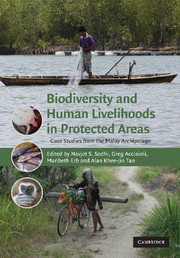Book contents
- Frontmatter
- Contents
- List of contributors
- Acknowledgements
- 1 General introduction
- Part I Conservation needs and priorities
- Part II Conservation with and against people(s)
- 11 Introduction to Part II
- 12 Collaboration, conservation, and community: a conversation between Suraya Afiff and Celia Lowe
- 13 Hands off, hands on: communities and the management of national parks in Indonesia
- 14 Conservation and conflict in Komodo National Park
- 15 Another way to live: developing a programme for local people around Tanjung Puting National Park, Central Kalimantan
- 16 For the people or for the trees? A case study of violence and conservation in Ruteng Nature Recreation Park
- 17 Seas of discontent: conflicting knowledge paradigms within Indonesia's marine environmental arena
- 18 Strategy and subjectivity in co-management of the Lore Lindu National Park (Central Sulawesi, Indonesia)
- 19 Indigenous peoples and parks in Malaysia: issues and questions
- 20 Protecting Chek Jawa: the politics of conservation and memory at the edge of a nation
- 21 Integrating conservation and community participation in protected-area development in Brunei Darussalam
- 22 Conclusion to Part II
- Part III Legal and governance frameworks for conservation
- 29 General conclusion
- Index
- References
17 - Seas of discontent: conflicting knowledge paradigms within Indonesia's marine environmental arena
from Part II - Conservation with and against people(s)
Published online by Cambridge University Press: 12 November 2009
- Frontmatter
- Contents
- List of contributors
- Acknowledgements
- 1 General introduction
- Part I Conservation needs and priorities
- Part II Conservation with and against people(s)
- 11 Introduction to Part II
- 12 Collaboration, conservation, and community: a conversation between Suraya Afiff and Celia Lowe
- 13 Hands off, hands on: communities and the management of national parks in Indonesia
- 14 Conservation and conflict in Komodo National Park
- 15 Another way to live: developing a programme for local people around Tanjung Puting National Park, Central Kalimantan
- 16 For the people or for the trees? A case study of violence and conservation in Ruteng Nature Recreation Park
- 17 Seas of discontent: conflicting knowledge paradigms within Indonesia's marine environmental arena
- 18 Strategy and subjectivity in co-management of the Lore Lindu National Park (Central Sulawesi, Indonesia)
- 19 Indigenous peoples and parks in Malaysia: issues and questions
- 20 Protecting Chek Jawa: the politics of conservation and memory at the edge of a nation
- 21 Integrating conservation and community participation in protected-area development in Brunei Darussalam
- 22 Conclusion to Part II
- Part III Legal and governance frameworks for conservation
- 29 General conclusion
- Index
- References
Summary
An environmental ethic requires that human behaviour be modified to agree with the ecology of the world, not the world be rearranged to suit human desires.
(Meeker 1980)Introduction
Conservation of the world's marine biological diversity has increasingly come to rely upon the establishment of formally designated protected areas. Whilst the overriding priority for such areas remains the conservation of marine habitats and associated biodiversity, environmentalists also widely recognize that the management of such areas cannot ignore the broad array of human interests and needs often associated with densely populated coastal regions. This understanding has led to the development of so-called ‘integrated’ approaches to marine management that environmentalists believe will enable important conservation goals to be achieved, whilst also accommodating the diverse needs of different user groups. Such approaches have come to rely heavily upon the creation of multiple-purpose management strategies that include the designation of different resource-usage zones, developing strict regulations and permit systems for the control of exploitative practices, as well as actively engaging in various forms of public education and awareness raising. In the face of major challenges associated with addressing issues of biodiversity loss and resource decline, Marine Protected Areas (MPAs) are today being widely promoted as a valuable strategy for marine conservation efforts globally.
Without urgent intervention, such as that proposed by a well-managed network of MPAs, it is argued that biologically diverse marine environments will continue to face ongoing decline and degradation with little future prospect for rehabilitation and protection (The Nature Conservancy 2006).
- Type
- Chapter
- Information
- Biodiversity and Human Livelihoods in Protected AreasCase Studies from the Malay Archipelago, pp. 241 - 265Publisher: Cambridge University PressPrint publication year: 2007
References
- 1
- Cited by



